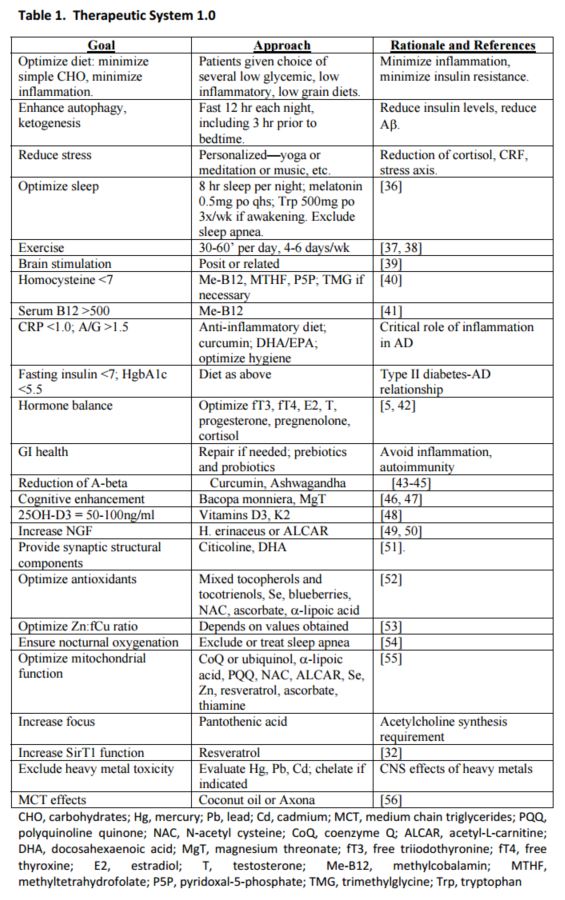Studied Naturopathic approaches towards cognitive impairment, memory loss, and Alzheimer’s.
I have encountered a number of patients requesting more information recently about what they can do to preserve their memory as they age. There are many books available with attendant products, gadgets, and techniques to improve and preserve memory. While some methods may not be entirely effective, there are many that have a proven history.
All that said, there haven’t been any studies that I’ve come across that have looked at the multitudes of potential causes of cognitive decline and sought to address and treat these potential causes in a comprehensive manner.
However, a recent series of personalized case studies out of UCLA published last year does in fact aim to identify potential causes and treatment of memory decline. It’s so well customized according to the various risk factors, that the structure and plans could have originated from Dr. Abercrombie or myself! This is exciting stuff! While I may tune some of the components or metrics, the study acts as a great starting point for anyone looking to assess a number of possible influences towards cognitive decline and to target specific treatments towards them. The study is provides both the framework for testing and assessments, as well as concepts for treatment.
One aspect about of the study that sets it apart from many others, is the emphasis on mitochondrial, methylation and hormone function; areas that are frequently not accounted for. When implementing this treatment for a patient, I also pay close attention to the hypothalamic-pituitary-adrenal axis, thyroid function, and the remainder of the genetically-related methylation pathway, as these can frequently be ‘upstream’ influencers on the metrics that are directly monitored in the study.
As the study notes, when you’re dealing with 36 different possible avenues, there may very well be 20+ interventions, thus making it difficult to initially implement. My suggestion is to complete proper laboratory work, exams, and conduct a lifestyle assessment to identify the areas that need improvement, then to prioritize focus on treating one section at a time
The table below from the study lists key metrics on the left, and a few possible treatments in the middle. Keep in mind that this is just a single example and that it is absolutely not a direct template that should be followed, given that each example is customized to the individual.

(http://www.impactaging.com/papers/v6/n9/full/100690.html)
The study outlines the treatment protocols for several individuals, with similar stories to those I have seen in my office. In one example, through the course of treatment, a 67yo woman with a family history of cognitive decline and a personal 2-year history of worsening memory participated in the customized treatment. After 3 months of implementation of the personalized treatment plan, she noted a reduction or complete elimination of ALL of her initial concerns.
What is an example of the Cognitive Treatment Plan?
This patient’s particular plan involved:
(1) eliminate all simple carbohydrates, leading to a weight loss of 20 pounds
(2) eliminate gluten and processed food from the patient’s diet, with increased vegetables, fruits, and non-farmed fish
(3) to reduce stress, the patient implemented a regular yoga practice
(4) as a second measure to reduce job stress, meditation was implemented for 20 minutes, twice per day
(5) body appropriate dose of melatonin each night
(6) she increased her sleep from 4-5 hours per night to 7-8 hours per night
(7) body appropriate dose of methylcobalamin (B12) each day
(8) body appropriate dose of vitamin D3 each day
(9) body appropriate dose of fish oil each day
(10) body appropriate dose of CoQ10 each day
(11) optimized oral hygiene using an electric flosser and electric toothbrush
(12) following a discussion with her the patient’s primary care provider, she reinstated a hormone replacement therapy program was reinstated that had previously been discontinued
(13) a minimum of 12 hour fasting between dinner and breakfast, and for a minimum of three hours between dinner and bedtime
(14) Regular exercise for a minimum of 30 minutes, 4-6 days per week.
I’m excited about this matrix approach towards treating cognitive and memory decline and look forward to seeing further studies emerging from this group. In the meantime, we will be using this research study as a starting point, further customizing it with extra Naturopathic related research and treatments and beginning similar treatments on a larger scale in 2016. If you’d like to participate, please do drop the office a line.
The study may be found at http://www.impactaging.com/papers/v6/n9/pdf/100690.pdf and a similar summary article athttp://neurosciencenews.com/alzheimers-memory-loss-reversal-1377/